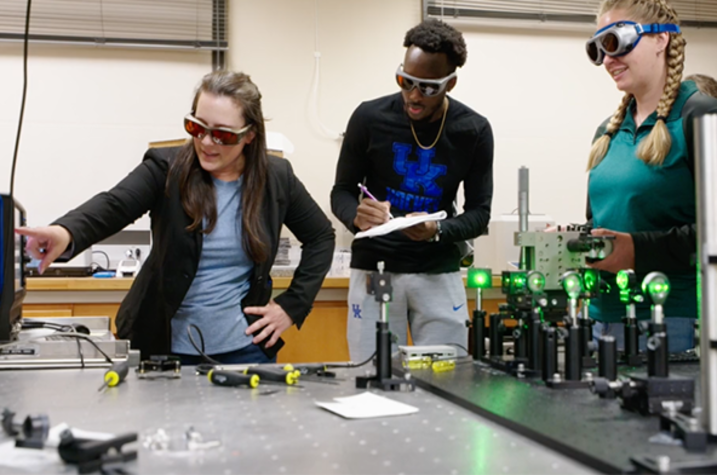NSF-funded engineering research to combat medical device infections
LEXINGTON, Ky. (Aug. 26, 2022) — When Martha Grady tells her students about her research, she describes it as “shooting lasers at stuff to see what happens.”
“And once they’re intrigued, then we talk about the technical language behind what we’re doing and what’s the material,” she said. “For me, that’s bacterial biofilms.”
An associate professor in the Department of Mechanical and Aerospace Engineering at the University of Kentucky, Grady’s research is a unique combination of her doctorate and postdoctoral education.
She studied thin film adhesion using synthetic materials at the University of Illinois Urbana-Champaign, while her postdoctoral research at the University of Pennsylvania exposed her to the mechanics of biological materials. As a result, Grady’s lab at UK studies thin film adhesion with biofilm-forming bacteria.
For her most recent project, “Mechanical Mechanisms of Biofilm Survival on Implant Surfaces,” Grady is the recipient of the National Science Foundation's (NSF) prestigious Faculty Early Career Development (CAREER) Award.
The honor is one of the “most prestigious awards in support of the early career-development activities of teacher-scholars who most effectively integrate education and research within the context of their organization’s mission,” according to the NSF.
The program will provide Grady with $600,000 over five years to conduct research surrounding biofilm formation on medical device surfaces.
You might be wondering, what is a biofilm?
“A biofilm is individual bacteria that form this matrix — this surrounding ‘goo’ let's call it. And they live inside this goo, and that helps protect them from things like antibiotics. And it can cause destruction,” Grady explained. “Half a million Americans have dental implants. When bacteria attach themselves to the surface, they can form a colony. They grow together, they create this goo and that’s really hard to get rid of — either through antibiotics or through scraping. Eventually, that can cause disease progression to where the implant must be removed.”
Grady is hoping to learn more about how these biofilms form on surfaces to help create strategies to decrease antibiotic resistance and combat medical device infections.
While the award is helping to make her research possible, Grady believes her students and colleagues are an invaluable resource.
“People talk about their science being the best product from their research, and for me, it’s definitely my trainees. What makes UK a unique place to pursue this kind of research is that we have so many different colleges on campus from which to establish collaboration,” she said. “I collaborate with dentistry and pharmacy. I’ve got colleagues in agriculture. I’ve got colleagues in medicine. And this kind of research — where we’re approaching antibiotic resistance — is going to take solving this problem from multiple perspectives.”
Research reported in this publication was supported by the National Science Foundation under Award Number 2045853. The opinions, findings, and conclusions or recommendations expressed are those of the author(s) and do not necessarily reflect the views of the National Science Foundation.

As the state’s flagship, land-grant institution, the University of Kentucky exists to advance the Commonwealth. We do that by preparing the next generation of leaders — placing students at the heart of everything we do — and transforming the lives of Kentuckians through education, research and creative work, service and health care. We pride ourselves on being a catalyst for breakthroughs and a force for healing, a place where ingenuity unfolds. It's all made possible by our people — visionaries, disruptors and pioneers — who make up 200 academic programs, a $476.5 million research and development enterprise and a world-class medical center, all on one campus.
In 2022, UK was ranked by Forbes as one of the “Best Employers for New Grads” and named a “Diversity Champion” by INSIGHT into Diversity, a testament to our commitment to advance Kentucky and create a community of belonging for everyone. While our mission looks different in many ways than it did in 1865, the vision of service to our Commonwealth and the world remains the same. We are the University for Kentucky.




